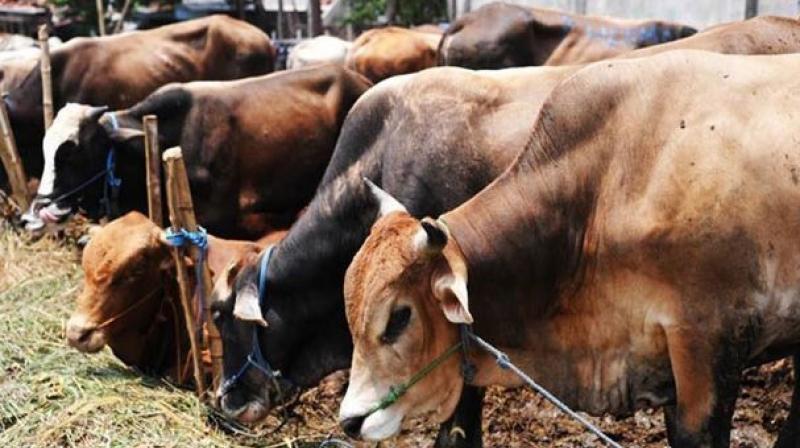Gujarat government to introduce harsher punishment for cow slaughter
The Bill seeks to amend the Gujarat Animal Preservation Act of 1954.

Gandhinagar: The Gujarat government is set to introduce a Bill in the Assembly providing harsher punishment for those found involved in cow-slaughter.
The Bill, which seeks to amend the Gujarat Animal Preservation Act of 1954, to provide for stringent punishments, will be placed for discussion and voting during the ongoing Budget session of the Gujarat Assembly.
Through the Gujarat Animal Preservation (Amendment) Bill of 2017, the state government seeks to introduce some major changes in the existing Act.
As per the Bill, those found to be involved in the slaughter of bovines, including cows, calves, bulls and bullocks, would face imprisonment up to 10 years, but not less than seven years.
In the present Act, which was amended in 2011, the maximum jail term for such acts was seven years, but not less than three years.
Further, the Bill seeks to double the amount of penalty, which is Rs. 50,000 at present.
On Sunday, Gujarat Chief Minister Vijay Rupani had hinted that his government is mulling to introduce a Bill having such stringent provisions to save cows.
In 2011, when Narendra Modi was the state's chief minister, the Gujarat government had imposed a complete ban on cow-slaughter, transportation and selling of cow-beef by amending the said Act.
Since then, the crimes related to cow slaughter in Gujarat are covered under the Gujarat Animal Preservation (Amendment) Act of 2011.
Under this Act, people found involved in cow-slaughtering and related crimes are penalised with Rs. 50,000 fine and a jail term of up to seven years.
Making another change, the present Bill has proposed that all the offences under this Act shall be considered as cognisable as well as non-bailable.
In the present Act, such offences are considered only as "cognisable" and not "non-bailable".
To deter people from transporting beef or bovines for the purpose of slaughtering, the Gujarat government has proposed to permanently "forfeit" the vehicles used in their transportation.
At present, such vehicles are liable to be "seized" for a period of six months, or till the final judgement of the court, said the Bill document.
Giving logic behind bringing such harsher punishment by bringing an amendment Bill, the statement of objects and reasons of the Bill said "some more stringent provisions are required to be made by amending the said Act for curbing the menace of illegal slaughtering."

